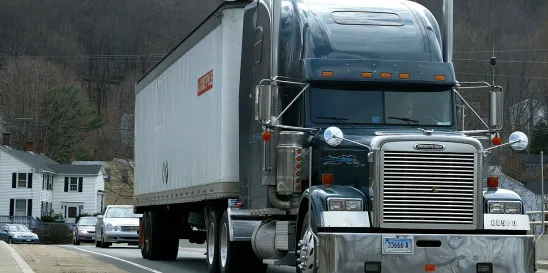Our economy depends on commercial trucking. In 2021, there were 13.86 million trucks registered, and they traveled a total of 327.48 billion miles in that year alone.1 In 2022, large trucks transported 72.6% of the total domestic tonnage shipped.2
With this significant presence, however, comes risk. In 2021, there were 494,000 police-reported crashes involving large trucks.3 Almost 25% of those accidents resulted in fatalities or serious injuries.4 From 2020 to 2021, truck accidents jumped by 11% (105,000 reported in 2020; 117,000 in 2021).5 Likewise, from 2020 to 2021, the number of large trucks or buses involved in fatal accidents increased by 18% (4,821 reported in 2020; 5,700 in 2021).6
It only takes a second for a truck accident to occur. Whatever the cause—whether the driver is distracted or tired or the weather creates dangerous driving conditions—the frequency of truck accidents continues to increase. If you or a loved one are involved in a truck accident, it is imperative to understand the legal issues and your rights as a victim.
Why Do I Need a North Carolina Truck Accident Lawyer?
Truck accidents can cause serious physical, mental, and emotional suffering. A truck accident can be catastrophic and complicated, making it difficult to advocate for yourself or a loved one. Our local truck accident lawyers have extensive experience with North Carolina truck accident laws. Hiring a lawyer allows you and your loved ones to focus on recovering.
Typically, navigating a truck accident is much more complex than the average car wreck. A truck accident lawyer can help you navigate complicated North Carolina and federal laws and will work to maximize your recovery.
Statute of Limitations. In North Carolina, the statute of limitations for truck accidents and other personal injury cases typically is three years. In a wrongful death claim, surviving family members must file a claim within two years. A truck accident lawyer can ensure you file your claim within the statute of limitations.
State and Federal Laws. The laws that apply to truck accidents may vary from those applicable in a typical car accident. In fact, it is likely that federal law will play some role in your recovery. The Federal Motor Carrier Safety Administration ("FMCSA") regulates the trucking industry. Among other things, the FMCSA sets specific rules for the conditions of trucks, cargo regulation, inspections, driver qualifications, and the number of hours a truck driver may be on the road. Determining whether a truck has violated FMCSA regulations is important. State or local laws may also be applicable to commercial trucks involved in truck accidents. Analyzing whether a truck has violated federal, state, or local laws (as well as determining which law prevails should there be a conflict) is imperative to your claim.
Navigating Sources of Insurance. If you are the victim in a truck accident, multiple insurance policies may be available to compensate you for your injuries. First, the truck driver and the owners of the truck, trailer, and cargo may all be different individuals or entities. The truck accident may trigger insurance policies belonging to each of these individuals (resulting in multiple policies for sources of recovery).
Second, it is important to investigate whether a truck driver is self-employed, an independent contractor, or an employee. If the driver is an employee, his or her employer may also be vicariously liable for the wreck. Even if the driver is a non-employee (such as an independent contractor), vicarious liability may still apply. If a company is on the hook for the truck driver's accident, additional insurance policies or sources of compensation may be available.
And, if the trucking company itself was negligent in the wreck, it may have independent legal responsibility. For example, a trucking company is negligent if it hired unfit truck drivers or allowed its employees to continue driving after learning they were unfit. If the company's actions are egregious enough, an injured party may have a claim for punitive damages (additional damages meant to punish the driver and/or the employer).
Lastly, it is important to investigate additional parties who may be at fault for the truck accident. For example, if other drivers on the roadway contributed to the wreck, they also may be liable. If state or local government allowed hazardous roadway conditions (such as creating unsafe construction zones or failing to provide adequate signage), it could also be on the hook for the accident.
Put simply, numerous individuals and entities may be liable for a truck accident, and it is imperative to locate all potential sources of recovery.
Evaluating All Compensable Damages in a Truck Accident. If you are injured in a truck accident at no fault of your own, you may be entitled to compensation for both economic and non-economic damages:
- Past, future, and present medical care and expenses
- Lost wages and diminished earning capacity
- Pain and suffering
- Permanency, scarring, and disfigurement
- Property damage
You also may be entitled to punitive damages. If the at-fault truck driver engaged in egregious behavior (such as excessive speeding or operating the truck while under the influence of alcohol or drugs), punitive damages may be available. If the at-fault truck driver's employer engaged in egregious behavior (such as completely disregarding federal regulations or allowing an unfit driver to continue to drive), you may be entitled to receive punitive damages. It is important to note that punitive damages are less common, as you must prove fraud, malice, or willful or wanton conduct. However, a seasoned North Carolina truck accident lawyer can help you navigate all potential damages you are entitled to receive.
Collecting the Evidence. In a truck accident case, time is truly of the essence. A truck stores its electronic data, and a truck accident lawyer can pull this data (like the speed at the time of the wreck and the efforts to brake prior to the collision). But, after a truck has returned to the road after an accident, this electronic data can be compromised. A truck accident lawyer can also locate other important data, such as ownership information, systems/tracking data (including GPS), daily truck driver logs, alcohol and drug testing results, inspection reports, maintenance and repair records, federal filings, freight and cargo records, employment documents and records, the internal policies of the truck driver's employer, and other documentation. If needed, a truck accident lawyer can also retain experts, such as an accident reconstructionist or information technology (IT) specialist.
Conclusion
A truck accident can be absolutely devastating. If you or a loved one are in a truck accident at no fault of your own, it is important to contact a North Carolina truck accident lawyer. They can help you navigate the situation, including investigating and recovering all sources of compensation you are entitled to receive. Hiring a truck accident lawyer puts the legal issues into the attorney's hands and allows you to focus on your recovery.
1 https://www.trucking.org/economics-and-industry-data
2 https://www.trucking.org/economics-and-industry-data
3 https://www.fmcsa.dot.gov/safety/data-and-statistics/large-truck-and-bus-crash-facts-2021
4 https://www.fmcsa.dot.gov/safety/data-and-statistics/large-truck-and-bus-crash-facts-2021
5 https://www.fmcsa.dot.gov/safety/data-and-statistics/large-truck-and-bus-crash-facts-2021
6 https://www.fmcsa.dot.gov/safety/data-and-statistics/large-truck-and-bus-crash-facts-2021




 />i
/>i
